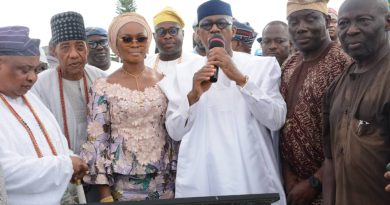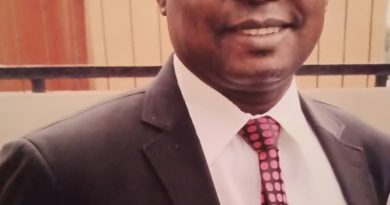Uni-Technics As Vehicle For National Development
By Esther Olaitan Ogundipe
The degeneration in Nigeria’s educational system is a reflection of the general social malaise and deterioration that pervades every facet of national life. Nigeria is an exemplar of maladministration and misgovernance. It has been raped, maimed and exploited. Foreigners ruthlessly feed on her while the country’s gate keepers fiddle. They loot her treasures and expropriate her goods. Visionless leaders govern her on impulses and caprices. She enriches others yet remains impoverished.
Nigeria has remained dependent since attaining independence. She is foreign-dependent – from toothpick to its native fabric which she now imports. Even her nature-endowed oil is at the mercy of outsiders. She lacks the skill and technology to produce what she uses. She is China – dependent and West-sustained. Yet her people are one of the most endowed globally – high in intellect, exploratory, success-driven, creative and innovative.
The Igbos of Nigeria, especially, have proven to be another Taiwanese or Chinese in the making. They are highly talented, creative, courageous and go-getters. All they need is the right socio-political and economic environment. Nigeria as a whole, is blessed with bourgeoning intelligent and adventurist youthful population, who can turn the tide of the nation’s dependency if accorded the right environment, and quality, technology and innovation-driven education.
President Bola Ahmed Tinubu recently stirred the hornets’ nest again. He called on Nigerians to patronise made-in-Nigeria goods. Reno Omokri, one of the President’s newest friends, had earlier campaigned – he even cited his own preference for Nigeria-made attire – that Nigerians should patronise locally-made brands. The goal is to strengthen the national currency and grow the economy.
Nigerians have heard, I suppose, and are poised, though in suspense, to heed the Presidential advice. Only that they are now wary of dual-faced leaders who speak from both sides of the mouth. “Do as I say and not as I do” is the philosophy of Nigerian ‘rulers.’ Nigerians are watching with keen interest. Time will tell. Nigerians are good followers, but they crave for leaders who profess and do. They want their leaders to drop the garb of hypocrisy. The country is half-enslaved, living on loans and imports. Yet her leaders carry on like Nero who fiddled while Rome burned.
In saner climes, leaders lose sleep when their country is failing. They explore every means to rescue, to salvage and recalibrate. They mobilise their people and emplace structures to springboard their country to greatness. Nigeria once enjoyed such leaders. The case is different for contemporary ones. They tell us to buy made-in-Nigeria goods, but flaunt the latest brands from everywhere in the world except Nigeria.
Medical and educational tourism have robbed Nigeria of a substantial amount of its scarce resources. Whereas, leaders of these destination countries aggressively market their countries and products, and strive to attract outside resources to enrich their economies. The British, for example, have benefited substantially from Nigeria through education and health tourism, and would like it to remain so.
Its time Nigerian leaders join the ranks of patriotic leaders. The distressed economy and degraded life in the country should give them sleepless nights. Concerned stakeholders should nudge the government to action. Nigerian leaders should brace up. They must acknowledge the fact that no nation develops or progresses socio-economically when it is sustained on hand-outs and its resources feed other economies.
Thankfully, the President himself has ignited the discourse. Nigerians need to patronise their own locally-made goods. I struggled to conjecture the goods that Mr. President had in mind. Did that include education of Nigerian children, including those of our ‘rulers’ at home? Which health institutions are Nigerians to patronize? Is it ‘Nigerian’ hospitals in France, UK, Canada, US, or those in Nigerian cities? Our leaders need to provide further particulars.
Thanks to Omokri who gave us a little insight: It is the locally made-fabrics, Innoson-made automobiles, Otedola telecommunications and few others. Besides these few products which Nigerian elites hardly patronize, it is on record that Nigerians depend on import for virtually every item they use, from the simplest to the most sophisticated. Even some of the items that could be produced locally, are sourced from other countries, and many of them take advantage of the lapses in our system to deepen the exploitation.
These countries have benefited immensely from Nigerians’ excessive taste for foreign products and lack of local industries to produce most of what is needed. Sadly, the economy is incapacitated by poor business environment that discourages production, and minimal qualified manpower to grow industries and drive domestic production.
It is apposite to say that countries develop, not by political prowess or compelling rhetoric. Growing a country is a serious venture. Strong, principled, and visionary leadership directs its course; leaders who are driven by ethos of selflessness, patriotism, and strategic thinking; and leaders that are apt at genuflecting to mobilize every resource to transform their economy. Such leaders rally their people by word and action. They build structures to springboard their country to a wisely determined destination.
Education ranks high among these structures. It is globally rated as a pivot of development and anchor of modernity. It is one of the critical ingredients of nation-building, the alpha-mega of contemporary development and quality living. It produces technology and is in turn defined by it. Today’s world is knowledge – governed, and “catch-up or perish” is the catch-phrase.
Why does education deserve such a ‘kingly’ treatment? It is because of its critical role in building and sustaining a modern society. It is the foundation for economic development. It is the reason global development agencies accord special status to education. It is a human right and its content is transformative. An education-deficient nation is a liability to itself and the global community. It partly explains why Nigeria, especially its Northern region, has suffered prolonged security crisis and arrested development.
Nigeria’s education and its managers, regrettably, seem to have lost their bearing. They are driven by philosophies inverse to development-inducing education. They glory in the number of universities and graduate turn-outs than the quality contribution they make to the society. It is the reason Dangote Industries, and other high -skilled enterprises, still rely mostly on foreign experts. Universities are multiplying while polytechnics are losing relevance and patronage. State-owned technical and colleges of education are undergoing conversion therapies.
The shortsightedness of our education managers was showcased when Chris Maiyaki, the Acting Executive Secretary of the National Universities Commission (NUC), recently stated that the 147 private universities are not sufficient for the 2 million applicants that seek university admission yearly. That is beside the 52 federal and 63 state universities that now exist mostly in nomenclatures.
No wonder the NUC keeps on issuing operational licenses to every ‘Dick’ and ‘Harry.’ As in other material acquisitions, that fire the ego of a typical Nigerian “money bag”, university ownership has joined the list of the vanities that elevate social status and decorate the shoulders of Nigerian “big men” and competing religious organizations. Nigeria turns out thousands of graduates every year, without requisite skill and commensurate opportunities to contribute meaningfully to societal development.
The mammoth unemployed among them are ‘graciously’ admonished by the government, to turn to farming, engage in artisan work, or establish small-scale industries. Interesting. Where are the infrastructures such as electricity, good roads, farming equipment and other supporting facilities to ennoble their efforts? “Afterall, with their university education, they must know how to prepare omelette without breaking egg!”
While the educational umpires are fixated on university proliferation, the polytechnics and technical institutes created to produce skilled technicians and professionals, and empowered to engage in applied research, are being demoted. According to the NUC scribe, interest in polytechnics admission has dropped sharply. Of course, it should. Polytechnic graduates are not only discriminated against in the job market, the government seems to have lost interest in them. Every road in today’s Nigeria leads to universities.
Our leaders need to wake up to the reality that sound, impactful, and productive education is the bedrock of contemporary nation-building and socio-economic development. A country’s educational system and its material contribution to the world, determines to a great extent, its socio-political status in an increasingly competitive world. If the current leadership is truly committed to recovering and transforming Nigeria, it must accord a priority status to the educational sector in the national strategic plan.
Countries that are forward-looking elevate education above rhetoric and politics. They tailor their education not towards mere certification but on quality scholarship, research, innovation, and skills’ acquisition, and competencies. All the top economies in the world, including China, Japan, UK and US, prioritize education, and have reaped immensely from their huge investment on it.
Their educational systems were conceived to produce top–notch graduates, scholars and inventors, whose researches and competencies fill knowledge gaps, facilitate innovation, and provide quality manpower for their industries and enterprises.
US superpower status partly derives from its educational philosophy and paradigm. India is climbing fast on the ladder of development, riding on the back of a well-thought-out technology-oriented educational system. Doctoral Thesis in Japanese Universities are usually purpose-driven.
Yet Nigerian Universities are grossly underperforming. It is hugely embarrassing that a country with hundreds of universities, and an array of natural resources that provoke the envy of other countries, still depends on other countries for its most basic needs. Most of these universities are ‘glorified’ secondary schools with little or no capacity for knowledge that could generate invention and innovation. Polytechnics and technical schools that were envisioned to provide hands-on technical skill to the country, have been relegated to the background.
It is mind boggling to see items that our polytechnic graduates can produce – if well trained – being imported from other countries. The APC presidential campaign T–shirts, for instance, were produced and imported from Guangzhou, China, in 2019. Yet the nation’s unconscionable leaders continue to fete citizens with the ‘gospel’ of patriotism and patronage of home-made goods.
If Nigeria must move forward, its leaders must jettison their taste for foreign goods, and lead by example. They must also acknowledge the fact, that without quality education, the country would remain slavish, foreign- dependent and undeveloped.
It would be refreshing indeed, to see a critical mass of Nigerian politicians, who are ready to turn the tide of mediocrity in our educational landscape and wean the nation of foreign/import-dependency. To achieve this, the government needs to re-evaluate its educational policies and evolve a strategic plan that would create a paradigm shift in our educational system.
Going forward, the government needs to prioritize quality education in its national development plan and elevate it to the status of change-agent.
First, policy makers should study the modules of successful countries and see how they have used quality and goal-driven education to drive their development.
Second, the NUC should pause the ridiculous licensing of universities that lack essential ingredients to produce the class of scholars and inventors that could drive national development.
Third, our leaders should rejig and reposition existing universities for optimum performance and global competitiveness. Fourth, our educational handlers should evolve a new national curriculum that would deliver world-class education in the country. Fifth, they should revive the polytechnics and technical institutes and integrate them into the national development plan.
It is time Nigeria embraces quality leadership and development-oriented education. It is time the country produces her goods and grow its local market. It is time it becomes a net exporter of goods than remain a chronic importer. Nigeria must move forward.
Esther Olaitan Ogundipe is a retired Diplomat and Public/Security Analyst lives in Abuja_ April 14, 2024




